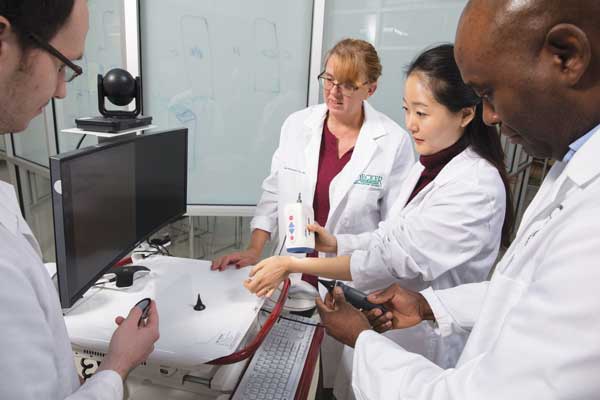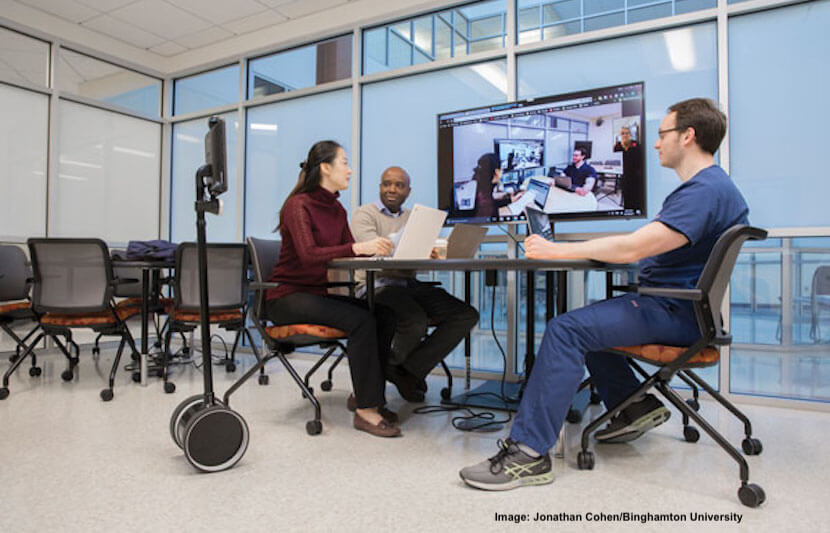The Decker School of Nursing at Binghamton University is giving telemedicine a big boost with its new Southern Tier Telemedicine and Mobile Health Research Development and Training Center. Telemedicine brings healthcare to a patient via telecommunication and information technology without the patient having to travel.
“With the new Center, we are able to expand simulation and clinical experiences for students as well as offer opportunities for the local community to explore possibilities in telemedicine,” said Ann Fronczek, assistant professor at the Decker School. “We can expose students to telemedicine and technologies that they may or may not have a chance to experience during their clinical rotations.”
The Center is the product of a joint effort by Mohammad T. Khasawneh, professor of systems science and industrial engineering in Binghamton’s Thomas J. Watson School of Engineering and Applied Science, and Fronczek.
The new Center could expand healthcare to local, rural and remote areas in many different ways, according to Fronczek.
“My personal goal is to expand the knowledge level of what is possible in telehealth to our nursing students who are preparing for roles at all levels of practice,” she said. “Telehealth will never replace clinical practice in a physical setting, but we can certainly reach a lot more individuals who may not have access to care. Telehealth technology allows many different types of healthcare providers to expand their reach to clients in need of care.”
Benefiting Students
The new Center has three fully functional telemedicine cart set-ups where students can practice doing assessments that are transmitted to another location, according to Fronczek.

The Center also has a telepresence robot that could open possibilities to experience clinical sites or education from a remote site, she said.
“We’ve built a little ‘playground,’ ” Fronczek said in a statement. “If someone is envisioning what’s possible, they can see the [equipment], play with it, touch it. The telemedicine cart allows us to conduct an entire visit; you can hear heartbeat and lung sounds, we have an otoscope [to examine ear canals and membranes] and an exam camera with high-definition transmission.”
The students are taught to use the new equipment to communicate with patients by Decker School’s clinical lecturer Judy Kitchin. Essentially, they are divided into groups in labs and take turns roleplaying as provider and patients.
“We’ll ask how they felt as the provider and how they felt as the patient, to learn how best to assess people over the screen while maintaining a nursing presence,” Kitchin said in a statement.
The results have been positive.
“The nursing students who have experienced the Center and the technology have found it to be very inspiring to what might be possible in their current and future clinical practice,” Fronczek said. “I think they are amazed that some of the virtual care that can be provided could be as good as seeing a patient in a physical practice setting.”
Benefiting Rural Communities
The Decker School is currently working with hospitals in six surrounding rural communities to train their healthcare providers to help deliver high-quality care to underserved patients.
One such hospital is UHS Delaware Valley Hospital in Walton, New York, which is a 25-bed critical access hospital about 60 miles from Binghamton. The hospital has started offering mental health services, and plans on expanding into other areas of healthcare, said Fronczek.
Through the Center, the Decker School was able to provide the hospital with some of the initial equipment support and telemedicine technology needed to help the hospital establish its telemedicine program, according to Fronczek.
While the Center does not provide clinical care from its facilities, it has the ability to support healthcare facilities in the areas of research, development and education, she explained.
Telemedicine is a boon to remote and rural areas.
“Because we live in an area with challenging travel due to lack of public transportation and mountainous terrain, and our service area includes those who are economically disadvantaged, it can be very difficult, if not impossible for them to get a specialist,” Dotti Kruppo, director of community relations for UHS Delaware Valley Hospital, said in a statement.
Telehealth provides access to care that otherwise is inaccessible.
It is also difficult for rural communities to recruit and retain qualified nurses, so the Decker School also plans on “growing our own nurse practitioners in these rural counties,” Nicole Rouhana, director of graduate nursing programs, said in a statement.
Students who want to be nurse practitioners are required to complete 660 hours of supervised direct patient care in clinical settings where telemedicine could be used, she continued.



